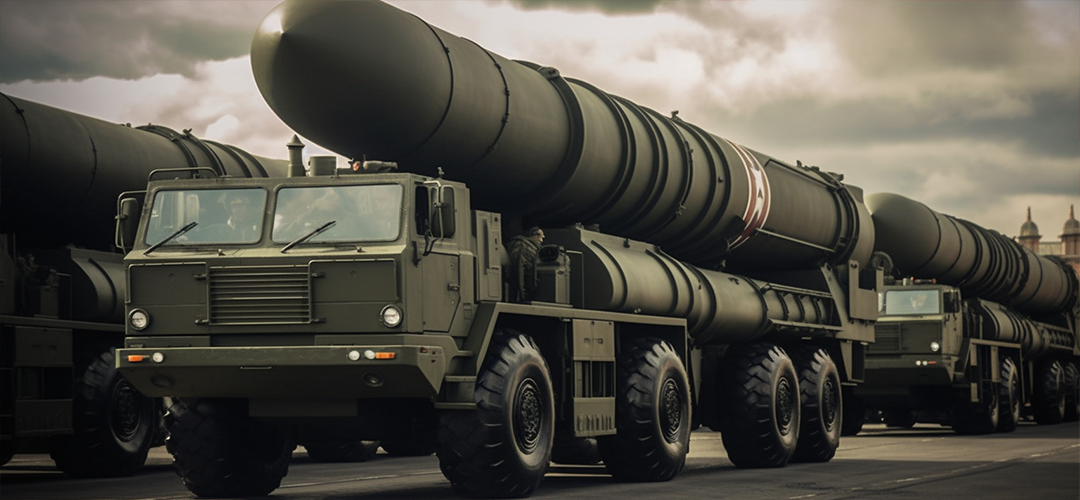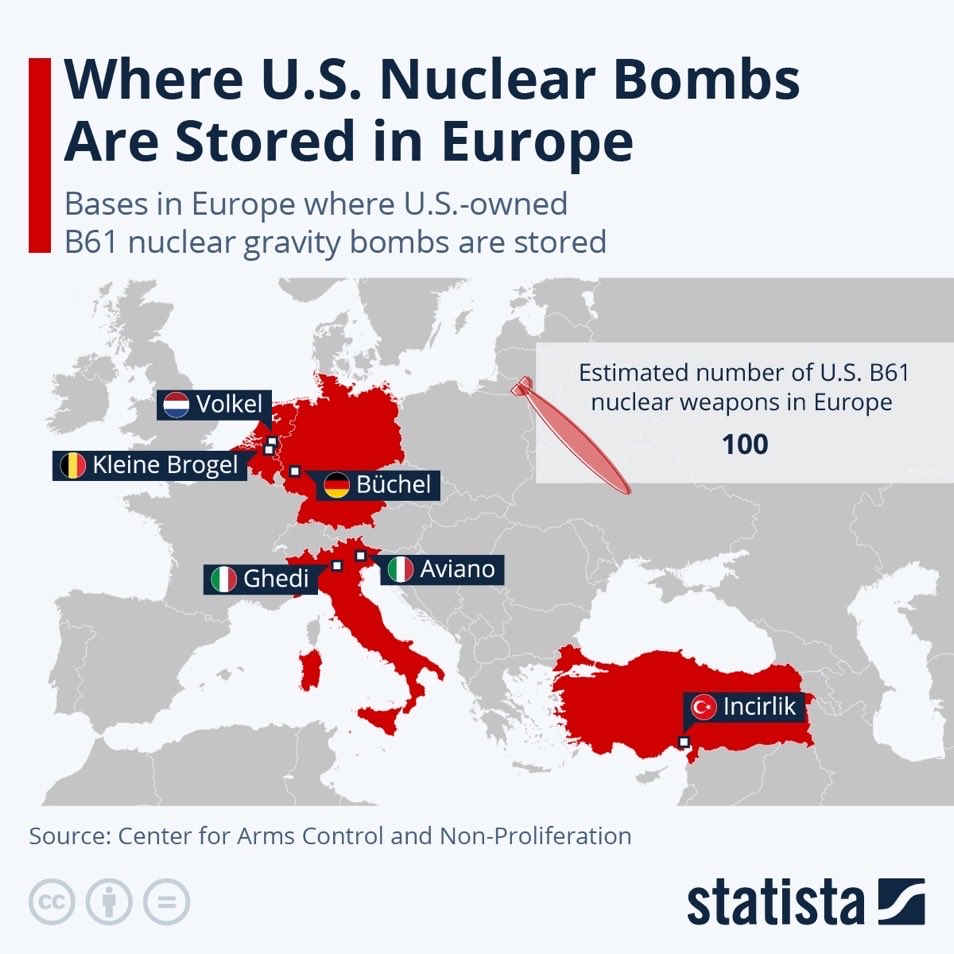Doomsday Clock: Ticking Closer?
April 1, 2023 | Expert Insights

Every day, the war in Ukraine springs a fresh surprise, and one that reverberates around the globe with even greater shock and dismay as the move has repercussions for the two protagonists and the world in general.
In the last week of March, President Putin made public his intentions to deploy tactical nuclear weapons in Belarus, one of the few remaining allies that Russia still has in this part of the world. As justification, Kremlin called out UK’s decision to provide depleted uranium (DU) tipped tank ammunition to arm the new generation western tanks being supplied to Ukraine. It also pointed to the American nuclear weapons deployed in bases in Germany and Turkey.
Background
It must be recollected that long after the two Gulf Wars, there have been reports of people being stricken by radio activity-induced sickness in Iraq. The US Abram tanks and the favourite close attack aircraft, the A-10 Thunderbolt, had made liberal use of DU-tipped ammunition in the whole-scale destruction of Saddam's tank inventory.
Expectantly, NATO went into overdrive, calling Mr Putin's statement "dangerous rhetoric." NATO spokesperson defended its own nuclear weapons deployment as responsible "with full respect of international commitments."
Now with the UK's announcement, with obvious American concurrence, to supply DU ammunition to Ukraine for its western tanks has set the cat amongst the pigeons!
In the coming months, we may see an interesting turn of events once Ukraine starts using its newly acquired fleet of Leopard, Challenger and Abram tanks, all capable of firing DU ammunition.
Moscow has evidently assured Belarus that it would be taken care of. The EU made it very clear that a sovereign nation like Belarus should be ready to face the consequences of hosting offensive nuclear weapons, even tactical ones, as they amount to " an irresponsible escalation and threat to European security."

Analysis
No resolution appears to be in sight in the slugfest that is going on in Ukraine.
Ukraine has convinced its western backers that it was confident of pushing the Russians out of Eastern Ukraine equipped with offensive weaponry like better tanks and aircraft. After that, it could negotiate a ceasefire that was more acceptable to its people from a position of strength, unlike the Chinese proposal that allows Russia to retain vast swathes of captured territory (rich farmland and industrial belt).
With the tanks arriving in Ukraine in batches, the expected Ukrainian counteroffensive may begin as soon as the spring thaw is over and the terrain in the steppe hardens to enable heavy armour movement. This could be around the end of April or early May. In case the Russians pre-empt the Ukrainian counteroffensive with one of their own, these new tanks would be useful in beating back the Russian armour spearhead. In both eventualities, the new tanks could be the game changer.
Therefore, in a scenario when a battered Russia feels it no longer holds the winning hand in conventional weaponry, the nuclear card comes into play. In the last year, Mr Putin has repeatedly reiterated that strategic deterrence is not a political tool to be allowed to gather dust but could be incorporated into his operational art in managing the Ukrainian conflict. In that context, the current deployment of tactical nuclear weapons in Belarus, for long acknowledged as a Russian proxy, should not surprise the West.
The war between Russia and Ukraine did not, of course, start with the nuclear threat at the forefront. In fact, the Russians were keen to keep the nuclear angle out of the picture, although it was common knowledge that their nuclear arsenal is a formidable one, with more nuclear warheads in its stockpile than the U.S. But when things did not go as per plans, and Kyiv and other major objectives refused to fall, Mr Putin started talking about his nuclear assets. With the sanctions biting, the nuclear sabre rattling became louder and could be credited to the NATO resolve not to put boots on the ground to further complicate matters.
Has Mr Putin been pushed to a corner forcing him to relook at the Russian nuclear doctrine? Even after the collapse of the Soviet Union and despite the various arms limitation talks, the Russian Federation continued to develop a modern nuclear deterrent.
Its official nuclear doctrine does not rule out the utilisation of these weapons in the case of the use of nuclear weapons against it or its allies or if a conventional attack on the Russian mainland becomes so serious that it threatens the state's very existence.
President Putin had placed a top priority on re-establishing the prestige of the Russian nuclear industry. Now that he feels threatened, he must show his trump card to keep his enemies at bay. Will it prevent the West from deploying the highly effective DU anti-tank warheads in Ukraine is something that has to be contemplated? It will definitely impose some caution on Mr Sunak, whose nation is already dealing with multiple crises on different fronts.
In January last year, all rationalists had expected Mr Putin to pull away from an actual assault at the last moment after forcing concessions from NATO and Ukraine about its security concerns. But Mr Putin behaved irrationally and launched a major invasion of a sovereign European state for the first time after World War II. Thus, it is natural for the West to be wary of an equally irrational move to launch tactical nukes within its territory or territory in its control to take out any major Ukrainian offensive after issuing suitable ultimatums. How will NATO respond if such an event, the stuff of nightmares, actually happens on the European continent?
Mr Putin's use of the nuclear deterrent in a totally conventional war, as one side has no nuclear weapons, is threatening to change the entire paradigm of nuclear balance. Nuclear arms, by their very nature, are more effective when they are used as a threat, not as warfighting tools. There are many historical examples to prove this. The United States itself contemplated going nuclear against China when its forces were being routed across the 38th parallel by Chines 'volunteers' in Korea in the 1950s and even when faced with an intractable foe in Vietnam. But in all instances, better sense prevailed, and the hawks, like MacArthur, were sacked. In fact, the U.S. has seldom needed to use the threat of nuclear weapons in a conventional war because of its overwhelming conventional superiority. This is where the Americans differ from the Russian Federation, which, having frittered away the full might of its conventional force, is now at a loss on how to win the war or retain the territory it has captured at great cost to Russian lives and treasure.
Legal experts may point to Russia's obligations to the international arms control treaties it is a signatory to. But, as the economic sanctions have shown when pushed to the corner, Moscow is unlikely to be overly concerned with legal niceties! In any case, what is left in the inventory of the West to punish Russia for a one-time use of a single tactical weapon that may not leave much of a radioactive fallout and impact only a few kilometres square of the tactical battlefield? Can the West transfer similar tactical nukes to Ukraine to retaliate? Most unlikely.
Assessment
- As far as Mr Putin is concerned, he is already at war with the West; the supply of offensive weapons underscores this fact, no matter what is said to the contrary. The only question is whether this will escalate to the nuclear level.
- President Putin has consistently stressed that he will consider the nuclear option only if the Russian regime is completely cornered. So, one red line is clear from this; do not attempt to carry out regime change in Russia. The second red line is any provision of lethal weaponry in Ukraine that will tilt the balance of power on the ground irrevocably in favour of Kyiv. The West is moving towards the second direction. Therein lies the quandary for both sides, locked in a death struggle economically draining the Russians and the West.
- Further escalation can only be prevented if both sides realise the huge danger lurking behind the use of nuclear weapons, even tactical ones, and decide to sit down and talk to prevent any miscalculations.








Comments